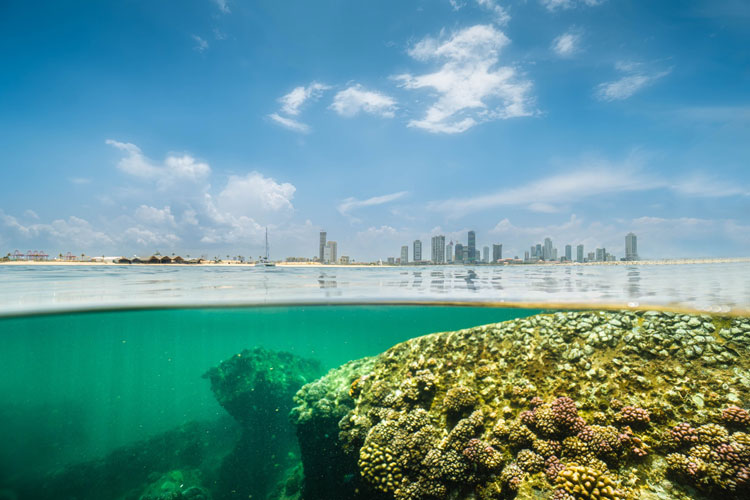Hambantota port’s cutting-edge project to protect coral reef
This is the first of its kind in Sri Lanka. Eco-conscious policies have favoured the creation of a sanctuary of biodiversity and minimise the port’s environmental impact. The first phase is set to be completed by May. For experts, it is a valuable project for sustainable practices around the world.
Colombo (AsiaNews) – The Hambantota International Port Group (HIPAG) recently launched the inaugural coral reef protection project, the first of its kind in a Sri Lankan port in line with a vision based on Corporate Social Responsibility (CSR).
The eco-conscious policies adopted by port authorities have favoured the creation of a sanctuary for the natural growth of different coral species along the port’s breakwaters and on the artificial island.
Over time, several colonies of flourishing-looking corals have developed within the channel and the basin of the infrastructure. Thus, different coral species thrive undisturbed in the vicinity of the breakwaters.
The project is an extension of HIPAG’s green port concept in cooperation with the Oceanic University of Sri Lanka (OCUSL), which is designed to minimise the infrastructure’s impact. The goal, the promoters explain, is to find a balance between industrial activity and environmental preservation.
Since the port is a high security zone with limited human interference (tourism and fishing), its artificial structures have been inadvertently transformed into an ideal breeding environment for coral larvae. This has led to the development of thriving coral reefs in a semi-artificial, protected environment.
The port has allocated an initial sum of 1.2 million rupees (US$ 4,065) for the first phase of the project, which is expected to be completed by May 2025.
“This project originates from the ecosystem nurtured by Hambantota International Port,” said HIPG CEO Wilson Qu at a recent media briefing. “Several thriving coral colonies have developed within the port’s channel and basin.”
“Recently, we decided that it was not enough to simply foster this natural growth. We also needed to investigate the phenomenon scientifically” since “Caring for the Planet is a fundamental aspect of our Environmental, Social, and Governance (ESG) framework,” and aligns with the United Nations 2030 Agenda for Sustainable Development.
“The key objective of this project is to focus on conducting a comprehensive baseline study to assess coral cover, species diversity, and the presence of diverse marine organisms, such as fish, invertebrates as well as algae,” said Marine scientists Dinuka Thrimavitana and Jayantha Maddumage speaking to AsiaNews.
“The research will also focus on evaluating sea water quality, and macroalgae growth with the ultimate goal of assessing the health of coral ecosystems, and their potential as models for future conservation and restoration efforts.”
“This project will focus on the monitoring efforts and conducting research during the next five months,” said Dr M.F.M. Fairoz, a marine scientist and senior lecturer in the Faculty of Fisheries and Ocean Science at OCUSL.
The focus will be “on evaluating sea water quality, and macroalgae growth, assessing the health of coral ecosystems and their potential as models for future conservation and restoration efforts,” Dr Fairoz explained.
“We also seek to establish a baseline for future monitoring that will help us understand ecological balance and provide insights into global coral conservation and restoration initiatives.”
“This project will be invaluable in shaping sustainable practices not only in Sri Lanka, but worldwide. It will be a significant environmental initiative and an excellent opportunity for education and research.”
02/08/2023 20:28







.png)










